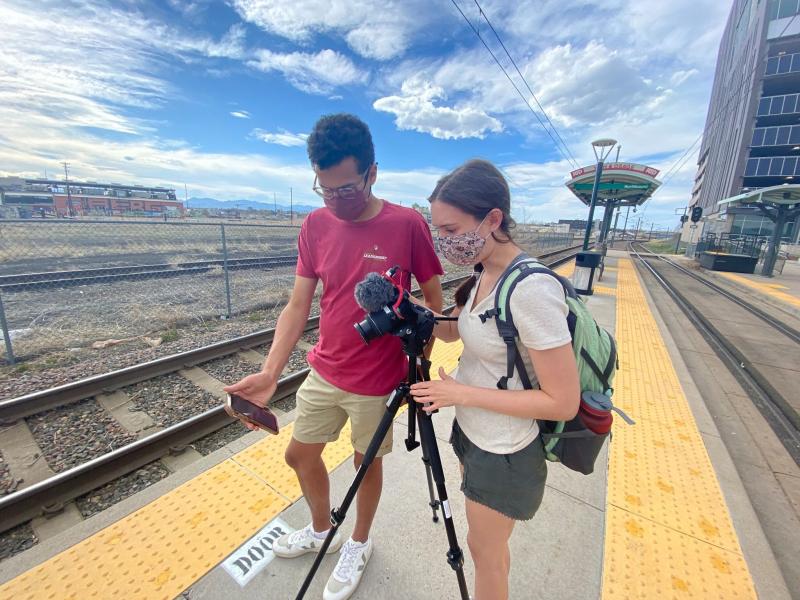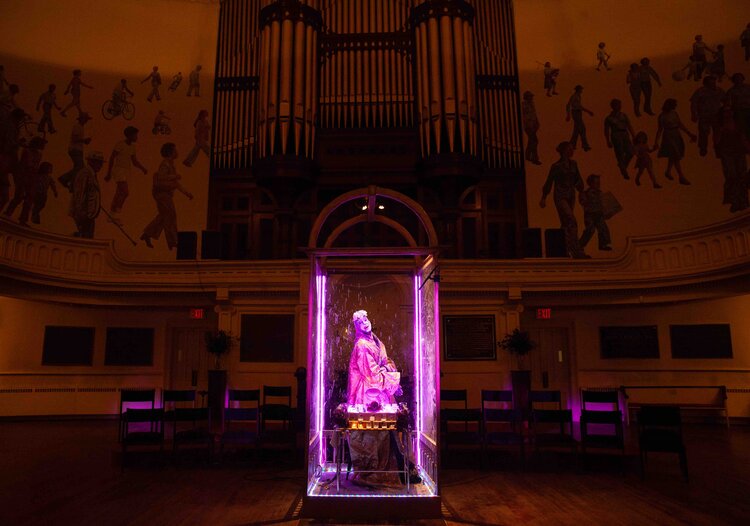Educational Videos to Support Independence
By: Whitney Buckendorf, International Studies, Public Policy; Corin Turner, Management; Sam Colvett, Public Policy, International Studies; Peyton Howell, Public Policy, Biology; Charlie Lemke-Bell, International Studies, Public Policy

The goal of this project was to create a set of educational videos for the International Rescue Committee (IRC) Denver Office to use over the course of their resettlement programs. The videos themselves contain information on how to obtain a money order, how to navigate the light rail and bus systems in Denver, and how to purchase tickets for both the bus and the light rail. Because the clientele of the IRC ranges widely in country of origin as well as language spoken, the videos contain either no dialogue at all or only the necessary dialogue for the processes at hand.
This Community Change Initiative (CCI) project is the product of a combined effort from our team, coach, and community partners. Our team is made up of five members; Whitney Buckendorf, Sam Colvett, Peyton Howell, Charlie Lemke-Bell, and Corin Turner, and was coached by Linda Olson, who is also the Executive Director of PLP. We partnered with both DU Media, specifically Kareem Raouf El Damanhoury, Jake Gloth, and Chloe Smith, in order to produce videos on behalf of our primary community partner, the IRC Denver Office.
We partnered with DU Media in order to guarantee a high-quality product. Our CCI team functioned as directors of the project, providing Chloe and Jake with the exact processes we needed to cover. This process was executed by the five of us compiling all of our own knowledge as well as performing some additional research into an exact process. This was then sent to Chloe and Jake with DU Media, who could create an exact shot list from the information we provided. Additionally, three CCI team members served as video actors. Over the course of three different filming days, we filmed all necessary footage for the videos, and then the DU Media team took over for the editing process.
The end product matches what we had initially envisioned. The use of these videos, surprisingly, will exceed what we had imagined, as they will not only be used to supplement the education of clientele, but they will also serve to educate many IRC employees who do not have experience with these services either. This will increase the independence of the clientele using the videos, as well as open up opportunities for deeper knowledge for IRC employees. The videos are also a sustainable effort, which is valuable in the way that the difference they are creating will last beyond our direct involvement in this project. Participating in this project has taught us more as students than any traditional classroom setting could. Experience making real change in a community was priceless, and it taught us many valuable lessons. First and foremost, we learned the art of communicating between multiple different organizations at once. Over the course of our project, we had to ensure that the product aligned with the IRC’s wishes while allowing room for DU Media’s input. Additionally, we had to liaise between the Pioneer Leadership Program (PLP) and DU Media to coordinate a payment schedule and ensure everything was in line for the product to be produced prior to summer. These juggling skills will serve us well in future endeavors both as students and in the professional world, as it is essential to be able to communicate amongst many different stakeholders. Additionally, we learned the importance of delegation, as we had initially intended to complete this entire project on our own, including performing the editing, filming, and entire production process. Had we decided to go down this route, not only would we have likely been overwhelmed by the amount of work, but we would have also likely ended with a low-quality product, as we lacked the level of expertise of DU Media. Knowing your own limits is important when entering a project in order to maintain quality, and the CCI provided us as a team an opportunity to learn that first hand.
While our time working on this specific project may be coming to an end, our CCI group has gained a passion for implementing community change that will last far beyond our CCI. We plan to utilize all that we learned over the course of this project to continue impacting the community around us.
Editor’s Note: This work was supported with an ACE Student Scholars Grant, thanks to the generous support of the Arthur Vining Davis Foundations for DU Grand Challenges.

